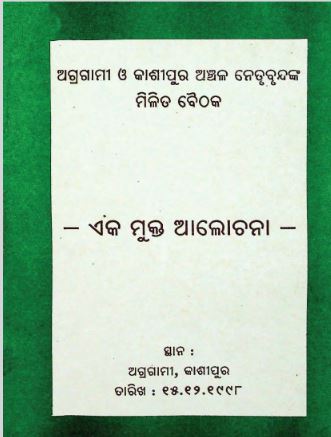Published in 1998, “Eka Mukta Alochana” emerges as a significant contribution to the literary landscape of Odisha, particularly in its exploration of tribal movements and the nuanced complexities of the indigenous experience. This essay book, written in Odia, delves deeply into the sociocultural and political dimensions of tribal life, shedding light on the challenges faced by these communities in a rapidly changing world.
At its core, “Eka Mukta Alochana” serves as a voice for the marginalized, presenting thorough insights into the struggles of tribal populations in Odisha and beyond. The title itself, which translates to “A Singular Free Thought,” encapsulates the essence of the book—the quest for autonomy, recognition, and the socio-political rights of tribal individuals. The essays within are not merely academic discourses but resonate with the raw emotions and lived experiences of the tribal populace, showcasing their resilience and spirit in the face of adversity.
One of the critical themes explored in the book is the impact of modernization and globalization on tribal communities. The author meticulously articulates the erosion of traditional practices and the existential threats posed by mining, deforestation, and displacement due to industrialization. There is a poignant examination of how economic interests often overshadow the rights and voices of tribal communities, leading to their marginalization in mainstream discourse.
Moreover, “Eka Mukta Alochana” highlights the various movements initiated by tribal groups, emphasizing their collective action against exploitation. Through a range of essays, the author captures the essence of these movements, portraying them as a fight for identity, land, and cultural preservation. The narrative draws from historical accounts, field studies, and personal testimonies, creating a rich tapestry of resistance that reflects the values and aspirations of tribal life.
In the sub-report format, the book also discusses the significant tribal movements in regions like Kasipur, illustrating the efforts of the local population to assert their rights against the backdrop of socio-economic challenges. The Kasipur movement, characterized by its grassroots mobilization and demand for justice, serves as a case study in the book. The author reflects on the intersectionality of caste, class, and tribal identity, framing these movements within the larger context of Odisha’s political landscape.
Equally commendable is the literary style employed in “Eka Mukta Alochana.” The writing is rich and evocative, combining scholarly rigor with a narrative approach that engages readers on both intellectual and emotional levels. The use of local dialects and references adds authenticity to the discourse, making the essays accessible to a broader audience while maintaining a scholarly depth that appeals to academics and general readers alike.
In conclusion, “Eka Mukta Alochana” is more than an essay book; it is a clarion call for recognizing and valuing the voices of tribal communities in Odisha. It invites readers to engage with the historical and contemporary realities facing these populations, fostering a greater understanding of their struggles and aspirations. Published at a time when discussions on indigenous rights were gaining momentum, this book remains a relevant and necessary addition to the discourse on autonomy, identity, and the pursuit of justice for tribal communities in India.
Books Info
| Books name | Eka Mukta Alochana/ଏକ ମୁକ୍ତ ଆଲୋଚନା |
| Author | NA |
| No Of pages | 13 |
| Publisher | NA |
| Publication | 1998 |
| Printed At | NA |
| Distributor | NA |
Eka Mukta Alochana full Pdf Download

